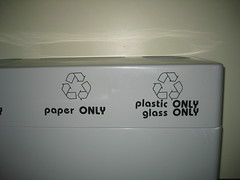@msauers: it sounds interesting because its the cool kids twittering. 🙂
BIGWIG is currently scheduled …
BIGWIG is currently scheduled to cover at least 32 sessions with at least 27 volunteer bloggers! Go LITABlog!
@chimprawk: Happy Wedding!
@chimprawk: Happy Wedding!
Getting up, heading to IG Chai…
Getting up, heading to IG Chair meeting, then getting ready for the BIGWIG Social Software Showcase: http://showcase.litablog.org
@msauers: Are you spying on me…
@msauers: Are you spying on me? I literally JUST BOUGHT THAT BOOK at KramerBooks in DC. Seriously. 30 Minutes ago.
@librarianaaron: the Brickskel…
@librarianaaron: the Brickskeller isnt BIGWIG sponsored, just fun and frivolity
Waste not…
So that photo is of the top of a trashcan on Friday at ALA Annual 2007. Why did I take a picture, you may ask yourself (this is not my beautiful house!)?
Because on top of the can are the contents of two of the bags that ALA distributes to every registered attendee. This was not an isolated incident…I have seen at least a dozen or so of these piles of paper, and I myself immediately tossed everything except the included map of DC. Probably 2 pounds of paper in every bag. There has got to be a better way of doing this, ALA.
Going to turn on Twitter2Blog for the extent of the ALA conference, to make it easier for me to post/keep up with things. If it falls apart and I don’t notice, someone let me know. 🙂
That word….
Gorman: the Musical!
David Lee King has just unleashed upon the world a song of such touching complexity, I expect major labels to be contacting him any day.
Brilliant, and funny. However, David, where is the Garageband file so that we can all remix it??

